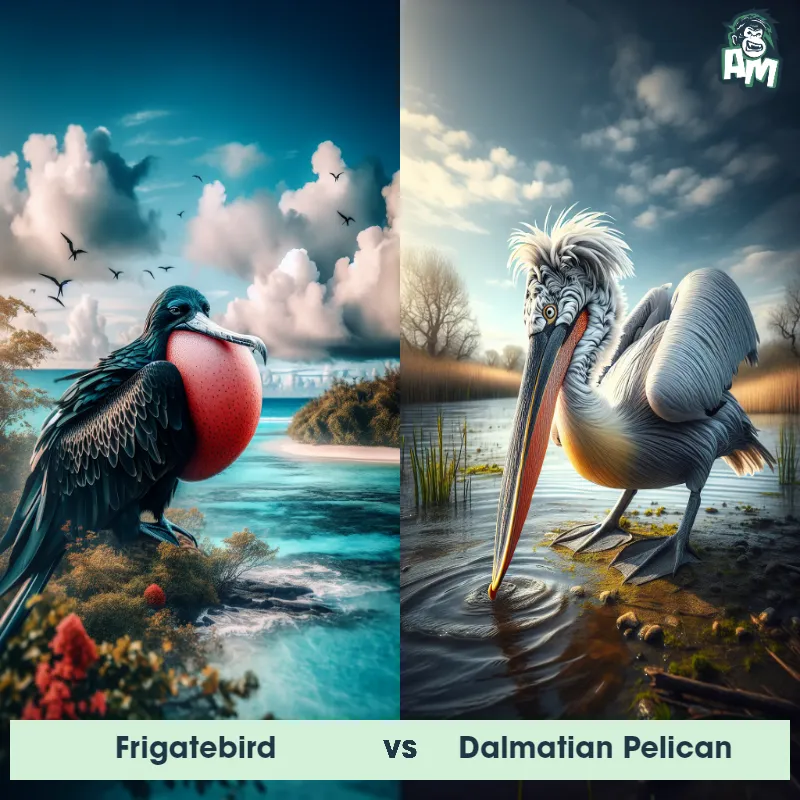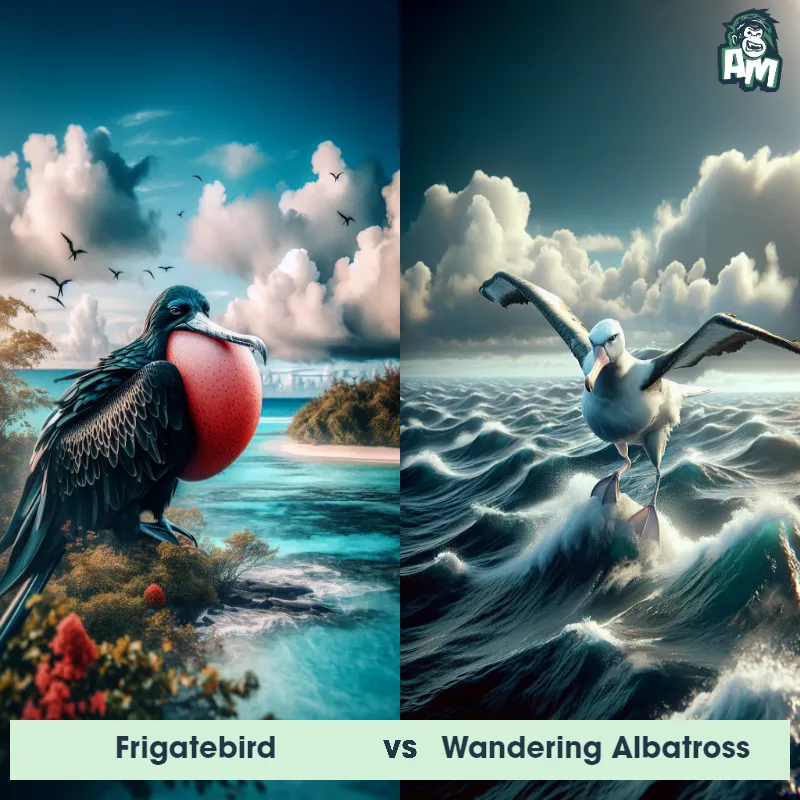The Frigatebird
The Frigatebird is a large seabird known for its impressive wingspan, which can reach up to 7.5 feet. With a slender body and a long, forked tail, this bird is especially built for long-distance flight. Frigatebirds have dark feathers, a hooked beak, and a distinctive necklace-like patch of bright red skin on their throat. They possess incredible agility and buoyancy in the air, effortlessly gliding over the ocean as they search for prey. These birds have a unique feature called a "gular pouch" which the males inflate during courtship to attract females.

| Frigatebird | |
|---|---|
| Size | Up to 7.5 feet wingspan (2.3 meters) |
| Weight | Up to 4 pounds (1.8 kilograms) |
| Speed | 95 mph (153km/h) |
| Key Strength | Exceptional agility in flight |
| Biggest Weakness | Clumsy on the ground |
| Scientific Name | Fregata |
| Family | Sulidae |
| Habitat | Coastal areas and open seas |
| Geography | Found in tropical and subtropical regions worldwide |
| Diet | Fish, squid, and other small marine animals |
| Lifespan | 20 years - 30 years |

The Frigatebird
The Frigatebird is a large seabird known for its impressive wingspan, which can reach up to 7.5 feet. With a slender body and a long, forked tail, this bird is especially built for long-distance flight. Frigatebirds have dark feathers, a hooked beak, and a distinctive necklace-like patch of bright red skin on their throat. They possess incredible agility and buoyancy in the air, effortlessly gliding over the ocean as they search for prey. These birds have a unique feature called a "gular pouch" which the males inflate during courtship to attract females.
![[object Object] Gif](https://tenor.com/view/frigatebird-gif-3574431.gif)
Fun Fact: The Frigatebird is known for being a master of stealing food from other birds - they often chase smaller seabirds in mid-air, forcing them to regurgitate their meal, which the Frigatebird then catches in its beak, essentially acting as a sky pirate.
| Frigatebird | |
|---|---|
| Size | Up to 7.5 feet wingspan (2.3 meters) |
| Weight | Up to 4 pounds (1.8 kilograms) |
| Speed | 95 mph (153km/h) |
| Key Strength | Exceptional agility in flight |
| Biggest Weakness | Clumsy on the ground |
| Scientific Name | Fregata |
| Family | Sulidae |
| Habitat | Coastal areas and open seas |
| Geography | Found in tropical and subtropical regions worldwide |
| Diet | Fish, squid, and other small marine animals |
| Lifespan | 20 years - 30 years |
Frigatebird Matchups
We use AI to simulate matchups between the Frigatebird and other animals. Our simulation considers size, strength, and natural predatory behaviors to determine the most likely outcome.

Can't find the Matchup you want?
Create Your Own MatchupFrigatebird: Diet, Predators, Aggression, and Defensive Behaviors
What do Frigatebirds eat?
Frigatebirds primarily feed on fish and squid. They are known for their remarkable aerial hunting ability, often swooping down from high in the sky to snatch prey from the water's surface.
Do Frigatebirds have any predators?
Frigatebirds have few natural predators due to their large size, agility in flight, and ability to defend themselves. However, they may sometimes be targeted by larger seabirds or raptors.
Are Frigatebirds aggressive?
Frigatebirds are known for their aggressive behavior, especially during breeding season. They will fiercely defend their territory and young from intruders, often engaging in aerial battles with other birds.
Do Frigatebirds fight?
Frigatebirds are territorial birds and will not hesitate to engage in physical fights over food, mates, or nest sites. These fights can be intense and may involve grappling, pecking, and aerial combat.
How do Frigatebirds defend themselves?
Frigatebirds have several defense mechanisms to protect themselves from predators or rivals. They have sharp bills and talons that they can use to ward off threats, and they are skilled at evasive flying maneuvers to avoid capture.
What is the Frigatebird's biggest weakness in a fight?
Despite their impressive aerial skills and aggressive nature, Frigatebirds have a vulnerability when it comes to their physical size. Their relatively large wingspan and lightweight bodies can make them more susceptible to injury or exhaustion during prolonged fights.
Fun Fact: Frigatebirds have the exceptional ability to sleep while flying, they have been observed sleeping on the wing with one eye closed and half of their brain resting at a time, allowing them to remain alert and aware of potential threats even when resting.
Fun Fact: The Frigatebird's wings are so long and narrow that they are unable to walk or take off from the ground, requiring them to take off from trees or high cliffs using strong wind currents to gain enough height and speed for flight.












